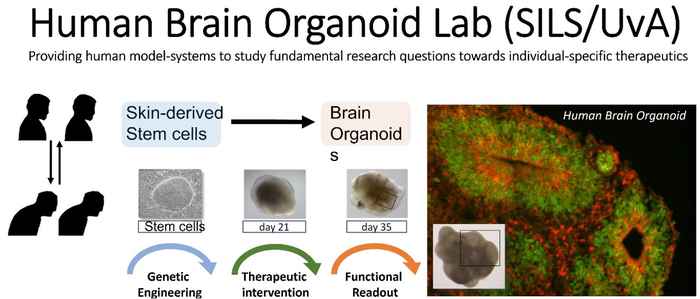Human Brain Organoid Lab
The Human Brain Organoid Lab at SILS, established and directed by Dr. Jacobs provides an animal-free platform to address fundamental research questions in human or patient-derived brain organoids; Three-dimensional neural tissues generated from patient-derived skin or blood cells. With that, the Human Brain Organoid Lab answers to an increasing need for translational research in Life Sciences by means of human and/or individual-specific model-systems: Firstly, the Human Brain Organoid Lab promotes and enables the transition to animal free research, where possible, and provides a relevant model system to address fundamental questions about human diseases in a highly controllable environment. Secondly, the ability to generate patient/individual-specific brain-tissues provides a unique platform to study the properties of human diseases or disorders in cells that have the correct genetic background with all connected inherent genetic risk or protective factors are captured. Finally, the Human Brain Organoid Lab provides a platform to study the molecular and physiological properties of human diseases in patient-derived cells in a minimally invasive manner, and allows for the development and testing of therapeutic strategies in vitro in order to provide a patient with the best possible diagnosis and therapeutic treatment scheme. Sofar, Jacobs’s team and the Human Brain Organoid Lab enabled a study on Zika Virus on neural cell types (Ayala-Nunez et al., Nat Comm 2019); Contributed to research on neurodevelopmental disorders such as the 1q21.1 deletion-syndrome (Fiddes et al., Cell, 2018) and the genetics of Alzheimers Disease (Van Bree et al., Genome Res 2022). Currently the Human Brain Organoid Lab is involved in a NWA-ORC consortium (ProMise 2019-2025); an international consortium for X-linked Dystonia Parkinsonism (CCXDP 2019-2024), and involved in a project funded by a Therapeutics company in the US (MAHZI) and a patient organization (FAR) to test therapeutic treatments for Coffin-Siris syndrome in patient derived brain organoids.
